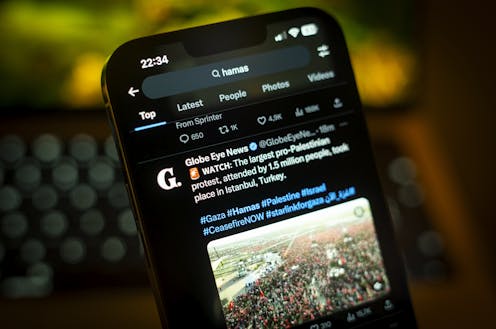War in Gaza: An ethicist explains why you shouldn't turn to social media for information about the c
Social media is designed to keep you engaged by getting a rise out of you, not help you think critically or take effective action on political issues.

As the war between Israel and Hamas drags on, many on both sides have taken to social media to gather information and air their outrage. The impulse to do so is understandable: Political activism on social media provides people with an emotional outlet and gives them a sense that they can do something. The war is awful, and following it generates a sharp psychological need to get involved and do something.
In the past few years, my colleagues and I at UMass Boston’s Applied Ethics Center have been studying the ethics of emerging technologies. I believe that political activism on social media is a counterproductive and sometimes even dangerous form of engagement. Here’s why.
Social media platforms such as X (formerly Twitter), Instagram, YouTube and TikTok are designed to maximize engagement. Their algorithms are tweaked to make sure that users spend a lot of time on them. The best ways to drive engagement are to either show people what they will likely agree with or to show them content that will outrage and shock them.
As a result, the content you will most frequently encounter on social media will either mirror your own views or upset you, or both. In other words, political engagement on social media most often generates no new knowledge while it inflames already raw emotions. When it comes to a conflict as historically convoluted and as emotionally charged as the Israel-Hamas war, those are terrible outcomes.
Getting it wrong on purpose
Then there is the well-known problem of disinformation.
Individuals as well as government agents have been posting false and misleading material to social media at a breathtaking rate since the beginning of the war. Russia, Iran and China have been running disinformation efforts meant to undercut Israel and bolster the image of Hamas. Russia and Iran have, for instance, circulated false information alleging that Israel bombed the Al Ahli hospital in Gaza and that the U.S. supplied the bomb used to destroy it, though most credible news sources agree that it was a misfired rocket from Gaza that hit the site.
Russia, Iran and China are using the war in Gaza to fight their proxy war with the U.S. As a result, the average social media user will be exposed to a great deal of content meant to promote the interests of those countries. Stated differently, you might go to social media for information about the conflict, but what you often end up with is propaganda.
Simple and snappy
Social media is also notoriously bad at mediating complexity. The realities surrounding the Israeli-Palestinian conflict are profoundly intricate – politically, historically and morally.
And yet, the very nature of social media platforms, with their space limitations and their calibration toward likes, shares and virality, is antithetical to conveying such complexity. For example, many social media posts describe Israel as a “settler colonial” entity. The state is characterized as a colonial enterprise that imposed itself forcefully on an indigenous Palestinian population. But the reality is more nuanced.
Israel was founded as a result of a United Nations partition decision, not as a colonial settlement, and Jews are as indigenous to the region as Palestinians. Yet, Israel does have colonies, considered illegal by many experts on international law, which were created after the 1967 Middle East war. The Israelis are not settlers or colonialists, but they do have colonies and settlers live in those colonies in the West Bank.
How can that complexity be conveyed on social media?
Take another example: Israel’s current government is the most far right it has ever had, and some members of that government have openly espoused Jewish supremacist views. And yet, Hamas’ attack on Oct. 7, 2023, had nothing to do with the identity of Israel’s government or with the fact that Israel occupies the West Bank. The organization rejects Israel’s right to exist under any government.
How can that duality be conveyed on TikTok? And who would have the patience to take it in?
It is the capacity to hold such complicated, uncomfortable realities together, in one thought, that can promote understanding about the Israeli-Palestinian conflict. But social media is designed to convey short, snappy, stark messages that are easy to grasp and repeat. Rather than helping people think about historical and moral ambiguity, social media usually promotes a cartoonish version of reality.
Rather than depth, so crucial for any insight about this terrible war, one gets the rule of anecdotes: A video clip of a Palestinian woman telling an Al Jazeera reporter that Hamas confiscates humanitarian aid is often shared as purported evidence that popular resentment against the group is growing. Maybe such sentiments are mounting, maybe not.
Obviously, there’s no reliable polling going on in Gaza now. And yet, social media users have presented the clip as an important piece of evidence.
Social media as instigation
Perhaps most strikingly, the very existence of social media serves as an impetus to create and share inflammatory content. This is one of the lessons that the Islamic State group taught the world with its made-for-YouTube brand of terrorism. That lesson was not lost on Hamas: On Oct. 7, some members of its Nukhba force – the commandos who led the assault – livestreamed their barbaric, murderous rampage in southern Israel with GoPro cameras.
The acts themselves were designed for social media consumption. The point was to shock and scare viewers. In the case of social media, the medium really is the message, to use Marshall McLuhan’s famous phrase. That means that the prospects of posting to Telegram or X influence the kind of content that will be created in the first place.
Mind your social media diet
All of this suggests two straightforward recommendations for anyone who wants to stay informed and politically engaged about this war: Don’t get your news from social media, and don’t focus your activism on social media.
These platforms are designed to make money for the companies that developed them and not to inform you or promote meaningful activism. Knowledge comes from consuming a variety of credible, vetted news sources. Meaningful political engagement happens between real people in the real world and is based on real information.
Social media can be used to point people to credible news sources and to organize real political activities. But most of the time it is not. Junk food harms your body; junk information and junk engagement harm the body politic. The most momentous political events of our lifetime deserve a greater degree of intellectual and political commitment than that.
The Applied Ethics Center at UMass Boston receives funding from the Institute for Ethics and Emerging Technologies. Nir Eisikovits serves as the data ethics advisor to Hour25AI, a startup dedicated to reducing digital distractions.
Read These Next
Taboo tics like shouting curses and slurs are uncommon in Tourette syndrome − but people who have th
Obscene language tics, called coprolalia, don’t reveal what people with Tourette’s think and feel.…
Why does pain last longer for women? Immune cells may be the culprit
Your immune systems kicks into gear when you’re injured, both worsening and relieving pain.
Why ICE’s body camera policies make the videos unlikely to improve accountability and transparency
For body cameras to function as transparency tools, wrongdoing would have to be consistently penalized,…






